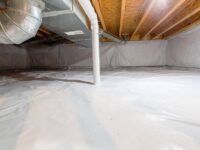Understanding Waterproofing Materials: A Detailed Look at Types, Uses, and Features
The Ultimate Guide to Waterproofing Materials: Types, Uses, and Features You Need to Know
In order to shield our houses and structures from the damaging impacts of water damage, waterproofing is essential. Waterproofing is necessary to preserve the structural integrity of any home, whether it is a bathroom that is prone to water seepage, a wet basement, or a leaking roof. Knowing the different waterproofing materials, their types, applications, and characteristics is essential to making an informed decision, given the wide range of alternatives on the market. We’ll examine waterproofing materials in detail in this post, explaining their significance, the various kinds, and the top choices for both commercial and residential settings.
There are numerous types of waterproofing materials, each appropriate for a particular set of requirements and uses. The most widely utilized waterproofing materials include epoxy resins, bituminous coatings, cementitious coatings, liquid membranes, and polyurethane coatings. Because of their unique qualities and advantages, these materials are perfect for a variety of surfaces and settings.
For instance, terraces and flat roofs frequently use liquid membranes. A thin, flexible membrane that can withstand water penetration is created by applying these components as a liquid and then drying them. They work very well to seal joints and cracks in building structures. For spaces like roof gardens and underground buildings that are subjected to constant water exposure, the liquid membrane is perfect. Liquid membranes offer durable protection for properties in areas with high humidity or significant rains.
Another standard option for waterproofing is cementitious coatings. These materials are frequently utilized in places like bathrooms and basements that get a lot of dampness. When applied to surfaces, cementitious coatings—which are created by combining cement and water—make a thick, impermeable covering. The material is highly resilient to deterioration and long-lasting due to its cementitious nature. However, because cementitious coatings can shatter under stress, they might not be appropriate for locations with continuous water pressure.
Bituminous coatings provide a very dependable option for locations like foundation walls and roofs that are more likely to be exposed to water. These materials are spread as a thick, sticky layer that creates a waterproof barrier. They are composed of bitumen and asphalt. Bituminous coatings can be applied to metal and concrete surfaces, and they are very good at preventing water leaks and seepage. Bituminous coatings’ resilience guarantees that they can tolerate even severe weather conditions.
For flexible waterproofing applications, polyurethane coatings are a great option. Roofs, balconies, and terraces are among the surfaces to which these coatings are applied since they are subject to expansion or movement. The seamless, waterproof layer created by polyurethane coatings permits expansion and contraction without sacrificing the waterproofing’s integrity. They are, therefore, perfect for surfaces that experience mechanical stress or temperature changes.
Epoxy resins are frequently utilized in applications that call for superior waterproofing. These materials are perfect for use in commercial and industrial buildings because of their exceptional strength and durability. Surfaces exposed to strong chemicals or hostile environments are frequently waterproofed with epoxy resins. Epoxy coatings are a crucial component of waterproofing in high-risk locations due to their resilience to abrasion, chemical exposure, and moisture, even though they might not be as flexible as polyurethane.
Making the correct waterproofing material choice is essential to guaranteeing your property’s long-term safety. The position of the surface, the degree of water exposure, and the building all influence the material selection. For example, choosing trustworthy and experienced waterproofing services in Delhi is crucial to ensuring that the waterproofing material used satisfies the unique requirements of the local weather in areas like Delhi, where intense monsoons can result in considerable water damage. A reliable supplier can help you choose the best tools and methods for efficient property protection.
Similarly, working with knowledgeable waterproofing companies in Kerala can make a big difference if you live in an area that receives high humidity and a lot of rainfall. These businesses focus on supplies and solutions designed to meet the particular difficulties presented by the regional climate. In order to keep your house or structure dry and structurally sound, frequently use materials that can tolerate continuous exposure to moisture.
Applying a material to a surface is only one aspect of waterproofing; careful preparation, application, and ongoing upkeep are necessary to guarantee the solution’s durability. A thorough evaluation of the property is required to pinpoint any weak spots. Then, the best materials must be chosen for a well-done waterproofing project. It’s critical to get advice from experts who are aware of the unique requirements of your house, whether you’re dealing with a leaking roof, a wet basement, or a bathroom that frequently seeps water.
Knowing the many types of waterproofing materials is the first step for anyone trying to protect their property from the destructive effects of water damage. Your property’s longevity and safety can be guaranteed by selecting the appropriate material, which will shield it from water-related problems that might otherwise result in costly repairs and structural failures. Homeowners may make the best choices for their properties by speaking with reliable waterproofing services in Delhi or waterproofing companies in Kerala that provide waterproofing services. In addition to offering protection, the ideal waterproofing solution raises the property’s total value and guarantees years of worry-free living.





